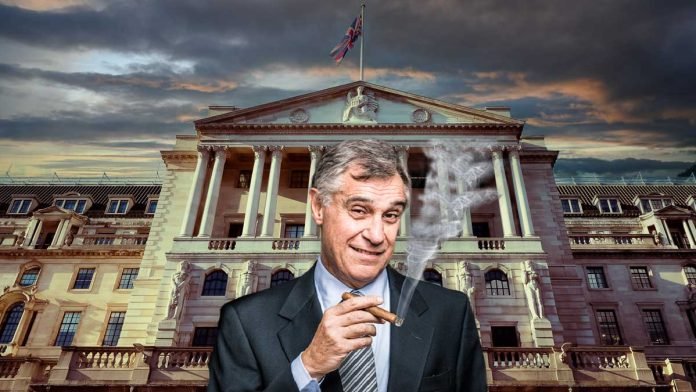The Cost of Living Crisis: Injustices and Failures to Tackle Inflation Root Causes in the UK
The cost-of-living crisis is one of the most pressing issues facing the British people today. With inflation at a 30-year high, and wages failing to keep up, many families are struggling to make ends meet. All this in our modern society, we have supposedly created a system that not only protects the country from economic stresses but the people too, or so the story goes.
To tackle this issue we have not only the government which is supposed to create a stable thriving economy that works both with the people it represents and business but The Bank of England.
The Bank of England is the central bank of the United Kingdom and is responsible for formulating and implementing monetary policy aimed at maintaining price stability and promoting economic growth.
8 big companies made a combined £62 billion in profit, up 20,650%. (Includes Maersk, CMA, Cosco, Hapag-Lloyd, Evergreen.)
Unite the Union
Its key role in the economy is to set and adjust interest rates to maintain inflation at or near its target level, which is currently 2%. It also oversees and regulates the banking system to ensure its stability and safety, and manages the country’s foreign exchange reserves. Additionally, the Bank of England conducts research and analysis to inform its decisions and provides advice to the government on economic matters. Overall, the Bank of England plays a crucial role in supporting a stable and healthy economy in the UK.
But you have to ask yourself how our institutions from Westminster to the Bank of England can function if they ignore the data, more so if they ignore the realities people face and the root cause of our current crisis.
Andrew Bailey, the Governor of the Bank of England, asserts that there is no evidence of companies profiting during the current period of inflation, even with all the goodwill in the world, for anyone, let alone the Governor of the Bank of England to suggest the current cost of living crisis is not caused by blatant profiteering shows a massive disconnect.
This so-called cost of living crisis didn’t start the day Russia invaded Ukraine or after the US blow up Nord Stream 2. This profit crisis started in 2021 when the Energy companies flexed their collective muscle and doubled their prices. From then on in they have made billions every quarter leaving the government and the BoE stood impotent in this attack on the people and business.
The top four energy providers made combined profits of £9.5 billion, up 84% on 2019. (Centrica, E.ON, EDF and Scottish Power)
Unite the Union
His assessment ignores both research and lived experience. The entire cost of living crisis has a root cause leading directly to Energy companies and their greed.
People and businesses have not only witnessed their Energy bills rise significantly without any other justification than profit-seeking by Energy companies but they have also seen their checkout bills rising exponentially.
But it’s not just the energy companies in a feeding frenzy of profit. According to a recent report by Unite the Union, the profits of Britain’s biggest firms have spiked by 89%, while wages for workers have remained stagnant. This means that companies are making record profits, but their employees are not seeing any of that money in their paychecks.
Profits per barrel jumped 366% between June 2021 and June 2022
Unite the Union
(Includes, Exxon Mobil, Valero, State Oil Limited, Phillips 66, Essar, Petroineos Refining Limited)
The Unite investigation research focuses on how rampant corporate profiteering has helped fuel the cost-of-living crisis, causing prices across the economy to rise while wages stagnate.
The report examines how profits are driving inflation, with corporate and investor profiteering taking advantage of the crisis to raise prices through five channels. The report examines the supply chains of key goods responsible for driving a large amount of overall inflation – energy, food, automotive, and transport – and shows how many supermarkets, retailers, and manufacturers are boosting their profits by increasing their prices even more than the rising supply costs.
The top three supermarkets – Tesco, Sainsbury’s and Asda – between them sell over half the UK’s groceries. They made combined profits of £3.2 billion in 2021, nearly double pre-pandemic levels.
Unite the Union
The report highlights how many companies continue to make high profits, and even as the economy heads towards recession, profiteering is systemic, affecting both workers and consumers. The report urges workers and communities to challenge the profiteers and effect change.
This is not a new phenomenon, of course. For years, workers have been struggling to make ends meet as the cost of living in the UK continues to rise while wages remain stagnant. The Bank of England has been aware of this problem for some time, but it seems that they have been reluctant to take action to address it.
Why is this? It could be argued that the Bank of England is simply out of touch with the realities of life for ordinary people in the UK. Its members may be insulated from the struggles of working-class families, and as such, they may not fully appreciate the urgency of the situation.
But there may be other factors at play as well. The Bank of England is supposed to be an independent institution, free from political influence. However, it is clear that the government of the day has a significant impact on the Bank’s decision-making process. If the current government is more concerned with pleasing big business than with ensuring that workers are paid a fair wage, then it is possible that the Bank of England is simply following suit.
The UK’s electricity and gas grids are run by private monopolies which made a combined profit of £6.3 billion – with operating margins over 40%. Companies include National Grid, UK Power Networks, SSE, Cadent Gas
Unite the Union
It is a well-known fact that the wages of the British working class have remained stagnant for several years, leading to a decline in their living standards. With millions of people struggling to make ends meet. Meanwhile, corporations have been raking in profits, with their executives pocketing exorbitant bonuses, and shareholders receiving handsome returns on their investments.
I would argue that raising interest rates to curb inflation is not an effective tool. The rationale behind this approach is that higher interest rates would make borrowing more expensive, thereby reducing demand for credit, which in turn would slow down spending and dampen inflation. However, this approach has several flaws.
Firstly, raising interest rates primarily affects a small section of society that has loans, credit card debt or mortgages, such as homeowners and businesses. This group may be forced to reduce their spending, which could lead to a decrease in economic activity, potentially causing more harm than good.
The top global oil companies made £174.5 billion in 2021, 37% higher than before the pandemic. (Includes, BP, Shell, Exxon Mobil, Conoco Phillips, Saudi Aramco.)
Unite the Union
Secondly, this approach tends to favour the affluent who have savings and investments, as higher interest rates would provide a greater return on these investments, boosting their wealth. In contrast, those with low incomes or no savings would not see any significant benefits from higher interest rates.
Thirdly, the impact of raising interest rates on inflation is not always straightforward, as it depends on the underlying causes of inflation. If inflation is caused by external factors, such as rising commodity prices or supply chain disruptions, then raising interest rates may not be effective in reducing inflation. If it is caused by one root factor Energy price profiteering, rising interest rates become just stupid unless of course you are offsetting the pressure and again transferring wealth to those that already have it including the Banks…
Again, the result of this profiteering is that working people are being squeezed from all sides. Their wages are not keeping up with inflation, and the cost of living is rising sharply.
Eight of the UK’s top food manufacturers made a combined profit of £22.9 billion, up 21% since before the pandemic.
Unite the Union
(Associated British Foods, Hilton Food Group, Arla Foods, Unilever, Cranswick, , Mondelez UK, Bakkavor, Nestle)
This is leading to a crisis of poverty and deprivation, and it is a crisis that is entirely avoidable.
The solution to the cost-of-living crisis is to take on corporate profiteering. We need to regulate corporations and force them to pay their fair share. We also need to raise wages and improve working conditions. This is the only way to ensure that working people have a fair chance of getting ahead in the current economy.
The Bank of England has been slow to recognise the problem of corporate profiteering. It has been ineffective at combating the root cause of inflation, the Energy companies. In fact, the Bank’s governor, Andrew Bailey, has suggested that the solution to the cost-of-living crisis is for workers to accept lower wages.
This is a deeply irresponsible and out-of-touch statement. It shows that the Bank of England is more interested in protecting the interests of corporations than the interests of working people, it shows his and the government’s only concern is profits for the oligarchy and profits for the banks…
We need to demand that the Bank of England take action to address the problem of corporate profiteering. We also need to demand that the government take action to protect working people from the cost-of-living crisis. The time for action is now. We cannot afford to wait any longer.
Sometimes there are moments when I cannot help but long for a certain je ne sais quoi, a touch of that French passion for protesting injustices, and perhaps a tad less of that stoic British reserve we call the stiff upper lip.” Maybe soon maybe when they push us a step too far, if this is not already far enough…
Support Independent Journalism Today
Our unwavering dedication is to provide you with unbiased news, diverse perspectives, and insightful opinions. We're on a mission to ensure that those in positions of power are held accountable for their actions, but we can't do it alone. Labour Heartlands is primarily funded by me, Paul Knaggs, and by the generous contributions of readers like you. Your donations keep us going and help us uphold the principles of independent journalism. Join us in our quest for truth, transparency, and accountability – donate today and be a part of our mission!
Like everyone else, we're facing challenges, and we need your help to stay online and continue providing crucial journalism. Every contribution, no matter how small, goes a long way in helping us thrive. By becoming one of our donors, you become a vital part of our mission to uncover the truth and uphold the values of democracy.
While we maintain our independence from political affiliations, we stand united against corruption, injustice, and the erosion of free speech, truth, and democracy. We believe in the power of accurate information in a democracy, and we consider facts non-negotiable.
Your support, no matter the amount, can make a significant impact. Together, we can make a difference and continue our journey toward a more informed and just society.
Thank you for supporting Labour Heartlands












